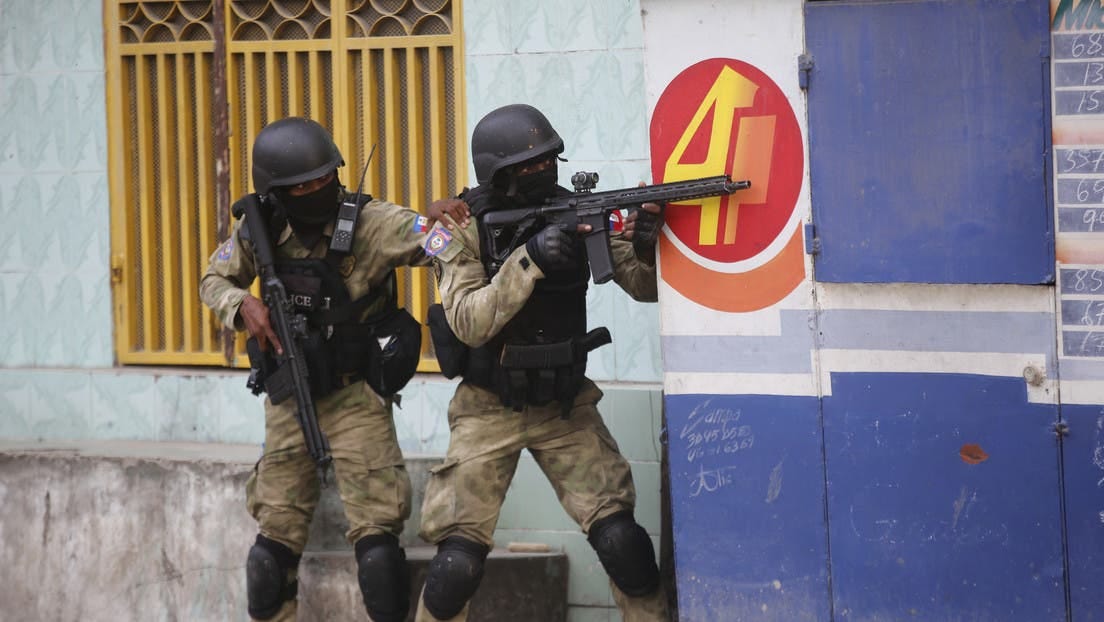Haiti: Can a not-so-new council of unelected officials rebuild a broken country?
Haiti has a new government. But just like many before it, it doesn't represent Haitians
Under international pressure and amidst political collapse, Haiti appointed a new unelected transitional council, which in turn chose yet another unelected Prime Minister. The embattled former PM, Ariel Henry, who was also unelected, was forced to resign last month and remains effectively in exile in Costa Rica. But the new council faces a host of barriers to actually being able to govern— not least of which is that it lacks any mandate of popular representation.
And though the council is new as a body, most of those on it have held some degree of power in Haiti for years.
A not-so-new set of faces take power
Amidst applause, smiles, and a champagne toast the nine members of Haiti's Presidential Transitional Council (CPT) were sworn into office in Port-au-Prince on April 25.
The swearing-in ceremony was originally scheduled at the National Palace but had to be moved to the Prime Minister's office, known as Villa d'Accueil, on the capital's outskirts. The reason? The area around the seat of government, like much of the territory of the Haitian capital, is controlled by gangs rather than security forces.
Haiti, the poorest country on the continent according to the World Bank, has been mired in political crises since its birth in 1804. Instability is a trademark for a nation that lived through the U.S. invasion in 1915, and the brutal dictatorships of François 'Papa Doc' Duvalier and his son, Jean-Claude, nicknamed 'Baby Doc', between 1957 and 1986.
The gangs that prevail in the country today are a legacy of the Duvalier regime. To avoid interference by the Armed Forces, 'Papa Doc' created the 'tonton macoutes', a personal paramilitary force whose objectives were to terrorize the population and persecute political opponents.
Today, the most famous public face of these armed groups, if not the most powerful, is former policeman Jimmy Chérizier, known as 'Barbecue' and leader of the G-9 and Familia gang. He is also the visible head of Viv Ansanm, the coalition that controls most of Port-au-Prince.
"Either we all sit around the table, or the table will be destroyed with all of us," he said in public comments after the council was formed.
Between April 30 and May 1, the president of the CPT, Edgard Leblanc Fils, and the new prime minister, Fritz Belizaire, were sworn in. Days later, in response, gangs laid siege to several neighborhoods in the capital, set fire to the houses of innocent residents, and clashed with police forces.
Violence as daily life
"I define Port-au-Prince as ‘tense calm’. Many here say the country has never been in a crisis as serious as this one. Violence has been normalized in the country," says Sandrine Exil, a Colombian-Haitian journalist.
Exile arrived in Port-au-Prince in mid-March to cover the situation in the country, "but there were days when I couldn't go out to work because I would get trapped in the center of the city," she tells PWS.
“People don't know if they will return to their homes at the end of the day. They live in uncertainty. They live, sleep, and work amid sounds of gunfire, which has also created a huge mental health problem."
Sandrine is staying at her grandfather's house and admits that while "for us, as foreigners, this violence is shocking," she feels that more and more Haitians "are learning to live with it."
"They live on autopilot and have an impressive capacity for survival. They more or less know where to walk and where not to walk," she said and explained that in some ways “their control is eerily calm. The real problem is the confrontations"— the battles between gangs fighting over territory.
"The list of deaths swells, but life goes on. People lose their homes but have to continue supporting and feeding large families," she lamented. "Food shortages are also a problem", since "even if people have money, the country has been closed for a long time and 70% of the products of a basic family basket are imported" rather than produced locally.
Even tasks as simple as going to work have become existential threats. “People don't know if they will return to their homes at the end of the day. They live in uncertainty. They live, sleep, and work amid sounds of gunfire, which has also created a huge mental health problem," she said.
Amidst running gun battles between gangs and security forces some 95,000 people, including more than 19,300 children and adolescents, fled their homes in and around the capital between March 8 and April 9.
Action without representation?
Robenson Glésile is a Haitian activist and human rights defender. He arrived in Rosario, Argentina, in 2011, after the terrible earthquake that shook his country. From a distance, but in daily contact with his family in Port-au-Prince, he is wary of what the CPT can achieve in such a divided social context.
"There is a feeling that Haitians cannot lead, that is the image that the leaders are projecting," he says, emphasizing the dismal results achieved in recent years by the traditional political class, allied with the United States and the international community.
He is part of one of the largest diasporas in the Americas. A diaspora that, he recognizes, is fed in part by the idea of leaving behind an unviable country.
"Sometimes you come across Haitians and they don't want to talk, they don't want to know anything,” he said. “If they have family, they talk to them, but they don't inform themselves anymore. They are ashamed to talk about Haiti, they prefer to talk about something else, about another life," he says.
This political apathy, he explains, leads to many commentators who "propose easy solutions, like installing a dictator or killing the gangs."
"Politics in Haiti is very violent, but replacing violence with violence doesn't work," he stressed, repeating himself to make sure his point was understood, “It simply doesn’t work.”
He is doubtful that the CPT, which is considering the possibility of negotiating with armed groups, will have much success coming to an agreement. "Negotiations [with gangs] give legitimacy to violence because they are not groups that are demanding something, they are groups that have to pay for what they have done: raping women, killing lots of people. How are you going to negotiate with someone like that?" he asks.
Glésile considers that the CPT is made up of "the same old faces" which have long governed Haiti, and who lack any electoral legitimacy. "I always say that the alternative would be to create something different, that has nothing to do with those that have already failed. We need new people, the youth, but I don't see the spark of a new group with proposals," he said.
Sandrine, for her part, believes that "in the CPT there is no clear or dynamic representation of the Haitian people", and "without this inclusion, it is not possible to create a real negotiating table with the gangs".
"[The members of the CPT] all belong to political parties in the country, they have been senators or ministers in past governments,” she said. “They were not democratically elected by Haitians as representatives.”
"The population, civil society, and even the gangs have cried out for a Haitian solution for Haitians," Exil remarked, adding that part of Haitians perceive the CPT as a form of intervention by the Caribbean Community (CARICOM) and other foreign forces.
Both agree on the importance of recovering security in the country and ensuring the fundamental rights of citizens are respected. "They have to create a climate of security and also think about how to organize the elections. But I know I am asking a lot from this political class," concludes Glésile.
The Big Headlines in Latam
Colombia officially broke diplomatic ties with Israel. In public statements announcing the decision, President Gustavo Petro repeated accusations that Israel is committing “genocide”. In response, Israeli ambassadors in the country accused Petro of “anti-semitism”, and “supporting Hamas”.
Petro has been feuding with Israeli officials for months, as we have covered before. Will this new official rupture mean an end to arms sales from Israel to Colombia? The Andean nation’s security forces are dependent upon Israeli small-arms especially.
We’re watching this story closely.
Panama goes to elections today (Sunday). Right-wing José Raúl candidate Mulino, a former security minister has promised to “close the Darién Gap”, the dense jungle migrant crossing that stretches the borderlands between Colombia and Panama, and which serves as the entryway to Central America for migrants headed north.
This is impossible, and honestly, kind of laughable. But tough xenophobic talk seems to be in fashion in the region.
Ship’s Business
Joshua is working on a series about his recent trip to the Darien Gap. His first piece came out Wednesday with the New Humanitarian. It explains how a Wild West economy has sprung up around migration the Colombian side of the border— one which is controlled by the largest criminal armed group in the country.
But are the people who have built this economy human traffickers? It’s not quite so simple. You can read the thoroughly reported piece here.
Spanish Word of the Week
The action of flirting has so many phrases and words to describe it in Spanish.
In English, sometimes we say someone is “hitting” on a potential romantic partner. In Spanish, it’s “cayendo”, or “falling”.
Creo que Tom me está cayendo- I think Tom is hitting on me
But there are a lot more colorful phrases out there too. You also echar perros, which translated literally means “to throw dogs" at someone. We think this is hilarious. But it perhaps might be better interpreted as “casting dirty ideas” towards a flirty new friend.
However, if you wish to throw dogs at your crush, we support that too.
Some phrases in Spanish describe very particular ways of flirting. In Venezuelan Spanish for example, you can soplar el bistec, or “air out the steak”, which means you want to steal the romantic partner of someone else.
So, in theory, you could “throw dogs” at someone who has already has a romantic partner. In that case, the would-be amorous canines you are tossing would be very excited to “air out the steak”.
We deeply love Spanish.
Hasta pronto, piratas!





Spanish word (phrase) of the week is a real favourite too.
Haiti's history is so sad particularly given its natural beauty. A relative of mine was apparently nearly murdered on more than one occasion by the Tonton Macoutes in the 1970s during what appeared to be a botched coup by the CIA in Port au Prince intended to topple Duvalier Junior.
If you are as intrigued as I am by Haiti and have fond memories of the Hôtel Oloffson in Port au Prince, Cap Haitien and even the slums in Cité Soleil, you should enjoy reading the fact based spy novel Beyond Enkription in TheBurlingtonFiles series.
However, if you think spy novels can only be written by John le Carré you may not appreciate this sui generis work. Nevertheless, it has been heralded by one US critic as “being up there with My Silent War by Kim Philby and No Other Choice by George Blake”.
No matter what, being fact based, Beyond Enkription is so realistic that it is hardly surprising it is allegedly mandatory reading on some countries’ intelligence induction programs.